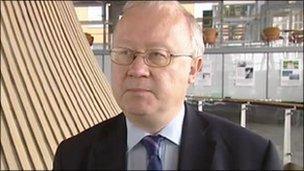The literacy challenge facing Wales
- Published

Compulsory reading tests are being introduced for five to 14 year olds in 2013
Whether you are a parent, a pupil, a teacher, or a politician in Wales, you will know that education standards need improving.
The Welsh education inspection body Estyn's latest annual report found 40% of pupils in Wales cannot read as well as they should be able to when they arrive at secondary school. And many of them will never catch up.
Wales' Chief Inspector of Schools says that is unacceptable.
The most recent tests for 11-year-olds in England put the equivalent figure at 16%.
Just as concerning is Wales' ranking in international tests for 15-year-olds. Wales is lagging behind England, Scotland and Northern Ireland in reading, maths and science.
Poor literacy is seen as the root of the problem. The challenge lies in knowing how to improve it.
Reading tests
Education Minister Leighton Andrews says tackling literacy is his priority.

Education Minister Leighton Andrews puts his faith in a five year national literacy programme
He believes a five-year National Literacy Programme will transform standards in Wales.
Compulsory reading tests are being introduced for five to 14-year-olds (Years 2 to 9) for the first time in Wales in May 2013. In May 2012, the Association of Directors of Education in Wales have agreed that all schools will use reading tests on a voluntary basis.
This is not testing for testing's sake, says Mr Andrews, but rather a chance for teachers to identify the pupils who need to be challenged, and those who need more support.
Standard Assessment Tests (Sats) were abolished in Wales in 2004. Since then, teachers have been responsible for assessing pupils, but across the board, a consistent approach has been difficult to find.
The new tests are perhaps the closest Wales will get to having a standard method of assessing pupils once again.
Performing well
Turn your focus to the Foundation Phase though, and the situation is altogether more positive.
It started in 2008, encouraging the youngest pupils to use their imagination and learn through play and outdoor activities.
This alternative method of teaching the under sevens has been widely praised. Boys in particular have benefited from the Welsh government's flagship policy.
Mr Andrews says that in the best cases, teachers are finding creative ways of introducing literacy and numeracy through the different opportunities that this phase offers.
Time will tell whether this will be reflected in exam results.
A growing funding gap between what Wales and England spend on each pupil is often blamed for the problems in the Welsh education system.
The gap now stands at more than £600 per pupil. Teaching unions unite in their condemnation of it.
The Welsh government says it is injecting more money into education, over and above what it gets from the UK government.
But the education minister points out that success does not always follow the money.
"One of the best funded local authorities in Wales is also one of the worst performing local authorities. It's not about funding, it's about the application of those funds," he says.
Learning lessons
The director of the Association of Teachers and Lecturers (ATL) in Wales, Philip Dixon, believes Wales could learn from other nations when it comes to literacy.
"While it's undoubtedly true that Wales' high levels and high concentrations of deprivation have taken their toll - too many children are from backgrounds where literacy is not valued and hasn't been for generations - that cannot be used as an excuse."
"There are examples from Scotland and the United States where these adverse social factors have been successfully overcome. And that's perhaps where we should be looking for inspiration."
"The English prescription is not one that we'd want to take, as it is far too rigid in its approach."
Business leaders are calling on the Welsh government to take "urgent action" to ensure school leavers are prepared.
Emma Watkins, head of policy at CBI Wales, said: "This is the first generation of school children to have been educated completely under the policies of the Welsh government."
"The skills of our people are a vital resource we ignore at our peril. Wales simply cannot realise the goal of a more prosperous nation without sustained higher skilled employment."
It is a year since the education minister announced a 20-point plan to improve standards across the board. The First Minister Carwyn Jones has said he expects it to lead to an improvement in literacy.
Twelve months on, the stakes could not be higher.
- Published31 January 2012
- Published2 February 2011